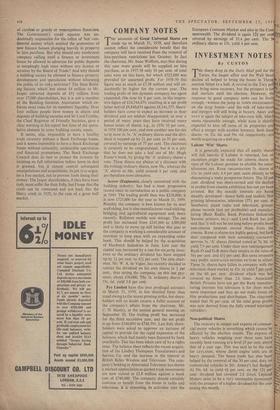COMPANY NOTES
rTIFIE accounts of Great Universal Stores are I made up to March 31, 1959, and therefore cannot reflect the considerable benefit that the
company will have received from the removal of hire-purchase restrictions last October. In fact the chairman, Mr. Isaac Wolfson, says that during this year more goods will be supplied on hire purchase, as in 1957-58 only 10 per cent, of total sales were on this basis, for which £323,000 was provided for unearned profit. For 1958-59 this figure was as much as £3.38 million and will un- doubtedly be higher for the current year. The trading profit of this dynamic company has again expanded, this time by 6 per cent, to the impres- sive figure of £24,744,479, resulting in a net profit (after tax) of £9,840,674 against £8,141,557. Share- holders have come to expect an increase in their dividend and are seldom disappointed, as over a period of many years they have received many bonus issues of shares, e.g., in 1956 10 per cent., in 1958 100 per cent., and now another one-for-ten scrip issue in 5s. 'A' ordinary shares and the divi- dend is stepped up by 2/ per cent. to 35 per cent. covered by earnings of 77 per cent. The chairman is certainly to be congratulated, but it is a pity that he does not take a leaf out of Mr. Hugh Fraser's book, by giving the 'A' ordinary shares a vote. These shares are always at a discount with the (voting) ordinary shares, now 50s., whereas the 'A' shares at 44s. yield around 4 per cent, and are therefore more attractive.
Acrow (Engineers), closely connected with the building industry, has had a - most progressive record since its introduction as a public company in 1949. The trading profit then was £218,000; it is now £725,000 for the year to March 31, 1959.
Possibly the company is best known for its steel scaffolding, but it also manufactures road-making, bridging and agricultural equipment and, more recently, Rollstore mobile unit storage. The net profit has increased from £241,000 to £309,000 and is likely to move up still farther this year as the company is working a considerable amount of overtime to keep pace with an expanding order book. This should be helped by the acquisition of Hardwick Industries in June. Last year the
capital was increased by a one-for-sixo,scrip issue; even so the ordinary dividend has been stepped
up by 21 per cent. to 421 per cent. The able chair- man, Mr. W. A. de Vigier, has recently decided to restrict the dividend on his own shares to 1 per cent., thus saving the company, on this last pay- ment, about £30,000. The 5s. ordinary shares at 55s. 6d. yield 3.8 per cent.
Pye Limited have this year producgd accounts to March 31, 1959, in less detailed form than usual owing to the recent printing strike, but share- holders will no doubt receive a fuller account of the company's affairs from the chairman, Mr. C. 0. Stanley, at the annual general meeting on September 30. The trading profit has increased for the third successive year, and the net profit is up from £540,094 to £748,591. Last July share- holders were asked to approve an increase of capital to provide for the rapid expansion of the business, which had mainly been financed by bank overarafts. This has been taken care of by a rights issue. The balance sheet reflects the recent acquisi- tion of the Lindley Thompson Transformers and Service Co. and the increase in the interest in British Relay Wireless and Television. The com- pany's holding in Associated Television has shown a marked appreciation as quoted, trade investments are now valued at £2.8 million against a book cost of £540,000. The company should certainly continue to benefit from the boom in radio and television; it is extending its activities into the E. European Common Market and also in the Com monwealth. The dividend is again 12/ per cent Mt covered by earnings of 35.4 per cent. The 5 ordinary shares at 15s. yield 4 per cent.


































 Previous page
Previous page